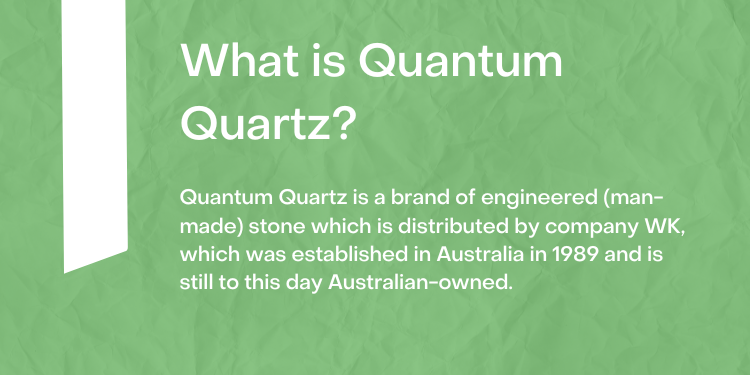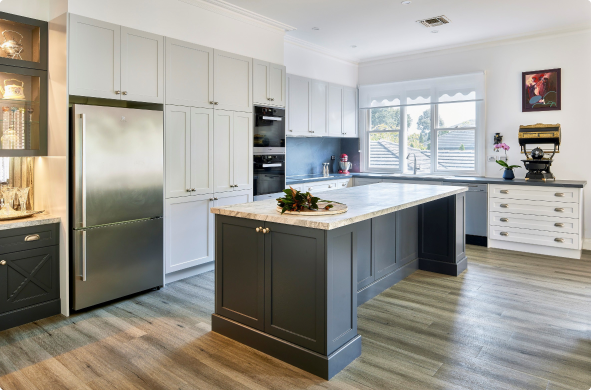What is Quantum Quartz?
You’ll have a plethora of options to choose from when selecting the benchtops for your kitchen renovation. Quantum Quartz is one popular option you may have heard of, but don’t know too much about—we’re here to fix that.
Read on to find out more about Quantum Quartz so you can decide if it might be the right choice for your new kitchen.
Key Summary
What is Quantum Quartz? Quantum Quartz is a brand of engineered stone made predominantly from quartz, combined with a bonding agent, pigment, resin and other materials.

What is Quantum Quartz?
Quantum Quartz is a brand of engineered (man-made) stone which is distributed by company WK, which was established in Australia in 1989 and is still to this day Australian-owned.
Quantum Quartz products consist predominantly of quartz (up to 93%) which is one of the hardest and most abundant natural minerals in the world. The quartz is combined with other materials including bonding agent, pigment and resin to produce a highly durable product which mimics the look and feel of natural stone, but for a typically more affordable price.
What’s the Difference Between Quantum Quartz, Caesarstone and Silestone?
Quantum Quartz, Caesarstone and Silestone (along with other well-known names like Smartstone and Essastone) are all different brands of engineered quartz benchtops.
While each product is very similar in terms of performance and aesthetics, the main point of difference lies in the comparable percentage quartz content, the number of available design options and the standard warranty included with the product.
Here’s a quick breakdown of how these leading brand names compare in relation to each of these (correct as at 2022):
| Brand |
Natural quartz content |
No. of design options |
Warranty |
| Caesarstone |
up to 93% |
Over 60 options |
Lifetime warranty |
| Essastone (by Laminex) |
up to 95% |
Over 40 options |
10-15 years (depending on range) |
| Silestone (by Cosentino) |
up to 94% |
Over 50 options |
25 years |
| Smartstone |
at least 93% |
Over 50 options |
15 years |
| Quantum Quartz (by WK) |
up to 93% |
Over 40 options |
10 years |
Is Quantum Quartz Only Used for Kitchen Benchtops?
While Quantum Quartz is most commonly used for kitchen benchtops, it can also be used for most other types of indoor applications in both residential and commercial settings.
Some of the other ways Quantum Quartz can be used include:
- splashbacks
- bathroom vanity tops
- bathroom walls
- floor tiles
- around fireplaces
- furniture (such as tables and desks)
Like most forms of engineered stone, Quantum Quartz can become slightly unstable when exposed to ultraviolet light or significant temperature fluctuations which makes it generally unsuitable for outdoor use.
What Are the Benefits of Quantum Quartz?
Quantum Quartz offers the following benefits:
-
- It’s highly durable: Quantum Quartz is very resistant to stains, scratching, chipping and abrasion with no sealing required. It also features a high chemical resistance.
- It’s strong: Quantum Quartz features a high flexural strength, giving you confidence that your benchtops will remain straight and true.
- It’s hygienic: The non-porous finish provides less opportunity for bacteria to become trapped on the surface, helping to keep your kitchen clean and hygienic.
- It’s easy to keep clean: Regular cleaning can be done simply with water and a soft cloth, or you can achieve a deeper clean when needed using a non-acidic, non-alcohol-based cleaning product. Tough stains can also be treated with a product-specific cream cleanser if required.
- It looks like real stone: Quantum Quartz is designed to emulate the look of natural stone. With an extensive design range featuring more than 40 different options, there’s sure to be a variety to suit every taste.
- It comes in a large slab size: Adopting a standard 3210 x 1610 x 20 mm slab size, it’s suitable for most applications.
- It’s an eco-friendly option: It’s Greentag Certified with a Level A GreenRate.
Are There Any Downsides to Quantum Quartz?
- It’s heat resistant, but not heatproof: While Quantum Quartz can handle some exposure to high temperatures, sudden changes in temperature (such as placing a hot pot or tray directly on the surface) could cause damage.
- It’s not suitable for use outdoors: Quantum Quartz (like any engineered quarts product) can be susceptible to UV instability, meaning some discolouration may occur if used outside.
How Does Quantum Quartz Compare to the Alternatives in Terms of Cost?
Most brands of engineered quartz are relatively similar in terms of price, however, you might notice some price variability between standard and premium design lines. Generally, most types of engineered quartz tend to be quite a cost-effective option when you consider the quality and aesthetics of the product.
Alternatives such as laminate can be significantly more affordable, however, it doesn’t provide the same level of durability or luxurious aesthetic compared to engineered stone.
While natural stone (such as granite or marble) performs well in terms of durability, it tends to cost significantly more than engineered varieties. You can generally expect to pay around $400 to $600 per square metre for engineered stone, while natural stone will likely cost somewhere from $700 up to $2,000 per square metre (with marble typically being the most expensive option).
Need Some Help With Your Kitchen Design? Speak to the Experts
A little help can go a long way when finalising the design for your new kitchen.
If you’re a little stuck selecting the best materials, fixtures and fittings for your kitchen renovation, the expert team of kitchen designers at Mint Kitchens can walk you through all the options, so you can make your selections with confidence.
Find out more about Mint kitchen renovations
<< back to our kitchen renovation glossary







